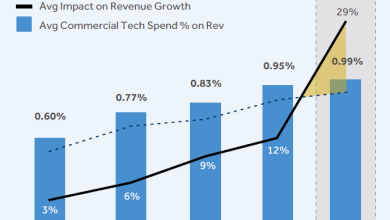
- The world’s biggest banks now employ more than 112,000 AI-related roles, despite a 23% decrease in overall hiring activity
- JPMorgan Chase and Capital One lead the AI talent race, with Wells Fargo, Citigroup, UBS and HSBC among the other standout performers
- The UK banks’ AI talent pool grew most quickly (+12% increase in AI roles), followed by the rest of Europe (+11%), and then the US (+10%)
The world’s biggest banks now employ more than 112,000 AI-related roles, according to AI benchmarking and intelligence platform Evident.
While overall hiring activity across 50 of the world’s largest banks is down 23% year-on-year, Evident’s latest AI Talent Report shows that there has been no let-up in the drive to bring in dedicated AI talent, as banks find themselves under immense pressure to harness AI technologies and deliver ‘more with less’.
The report examines the central role that talent is playing in the AI transformation of the banking industry, as banks look to recruit, upskill and retain the roles and skill sets necessary to deploy AI at scale.
Evident reveals that the 50 banks tracked in the Evident AI Index added almost 10,000 net new AI roles (9,238) and posted 17,836 AI-related job descriptions between Q4 2023 and Q1 2024.
JPMorgan Chase (JPMC) and Capital One lead the AI talent race based on existing talent capability, new roles added between Q3 2023 and Q1 2024, and remaining open job vacancies*.
Wells Fargo has added the greatest number of new AI roles other than JPMC, but appears to have slowed its hiring efforts. Citigroup’s open AI job roles are outpacing Bank of America by 2.8x, as the bank looks to catch up to its rival.
While UBS leads Europe in talent volume following its merger with Credit Suisse, the bank has added the fewest additional roles over the past six months of any bank in Evident’s Top 10 leaderboard. Recent job openings have also trended lower than peers. By contrast, HSBC has posted 30% more open AI roles than its immediate European peers between Oct 2023 and April 2024.
Alexandra Mousavizadeh, co-founder and CEO of Evident, comments:
“After a brutal wave of layoffs, AI investment is viewed by the banks as the panacea that will allow them to bring about the needed productivity gains from their remaining workforce.
“By analysing the AI talent the banks are bringing in, we can determine which institutions are best placed to make these gains a reality. JPMorgan Chase and Capital One are the trailblazers. They’re laying down the blueprint for others by addressing AI talent strategy across multiple time horizons—balancing what they need today versus what they’ll need tomorrow, and recognising both the need to bring in external AI talent, as well as the need to retrain and upskill existing employees for the challenge ahead.”
UK and European banks step up the pace of AI hiring
The overall pool of banking AI talent has grown particularly in Europe between Q4 2023 and Q1 2024, with the UK banks growing most quickly (+12% increase in AI roles), followed by the rest of Europe (+11%), and then the US (+10%).
Among the European banks, Deutsche Bank and Santander have increased AI headcount fastest, alongside Barclays, HSBC, and BNP Paribas, which are together responsible for driving the growth trends seen in the UK and Europe.
Retraining and upskilling is needed given the shortage of available AI talent
With a persistent talent shortfall in the AI labour market for the foreseeable future, the Evident AI Talent report also reveals a continuing effort among the world’s biggest banks to retrain and upskill existing talent for the AI adoption journey ahead.
According to Evident, Société Générale, Capital One, DBS, and JPMorgan Chase are among the standout performers for their current AI talent development practices**. Société Générale was the only bank to achieve a perfect score across training and career development in the most recent Evident AI Index.
AI talent development best practices revealed
In order to implement AI at scale, banks are actively focusing on four areas of AI talent development:
- Long-term resource planning: thinking about the strategic workforce plan across multiple time horizons.
- Group-wide onboarding for technical talent (“builders”): supporting the high level of AI graduates joining (60% of all incoming AI talent) with training programmes that establish a shared baseline for incoming “builders”, so they can quickly add value regardless of where they ultimately work across the wider organisation.
- Upskilling and educating both “leaders” and “users”: looking beyond “builders” to the rest of the bank, whether training “leaders” in AI literacy, or upskilling and educating the ultimate “users” of promising AI tools and applications.
- Balancing central coordination with decentralised training: recognising that Group-level orchestration of AI talent development is aspirational, and decentralised training may be needed when addressing talent across the naturally siloed lines of business found at most banks.
Mousavizadeh adds:
“The race for AI adoption isn’t over, but talent remains a critical driver of future success, and banks need to adopt a comprehensive view of AI talent that helps evolve the organisation at every level.
“Alongside sourcing technical talent through hiring or retraining, banks must also look at how to educate their leaders around AI strategy and communicate it effectively, set up incoming technical AI talent for future success, and upskill and educate their wider workforce who will be using these tools – this is ultimately where AI ROI will be determined.”




